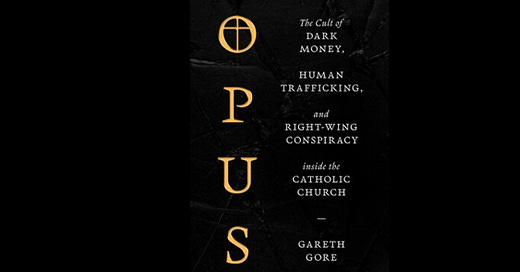A quick note: I did this interview and writeup before the latest round of violence in the Middle East, which I know is on many of our hearts and minds. That said, the subject of this conversation is important, possibly even shocking, and the publication day of the book is this week. So, we’re running it as planned. -jm
By now, Leonard Leo — the religious zealot and political operative responsible for Donald Trump’s nominees to the Supreme Court — is well-known to politics junkies. I’m proud to have played a small role in that: back in 2018, I wrote the first significant investigation of his activities. But what we knew in 2018 was just the tip of the iceberg: since then, other journalists have taken the story farther and deeper than I could have imagined, detailing webs of dark money funding, connections to Clarence Thomas’s appalling corruption, and a theocratic network that ran like a subcurrent through the Trump administration—and has now produced much of Project 2025.
Turns out, even that iceberg is a tip of an even bigger iceberg.
That iceberg — the truly nefarious and vast operations of Opus Dei, an independent (but officially recognized) extreme-right Catholic organization founded in 1928 — is the subject of a shocking new book by investigative journalist Gareth Gore called Opus: The Cult of Dark Money, Human Trafficking, and Right-Wing Conspiracy inside the Catholic Church, which was published this week by Simon & Schuster.
Thanks to The DaVinci Code, Opus Dei is somewhat well-known as a network of (literally) self-flagellating religious ultra-conservative Catholics who believe that the Catholic Church itself, since Vatican II, has veered from the true path of intense piety and sexual purity.
That is somewhat true, but just a small part of what Opus Dei is about. While most of Opus Dei’s 90,000 members are not privy to the organization’s political work, the inner circle of roughly 30,000 “numenaries” are involved in far-right political, educational, and financial activities around the world. (Leo himself has disclaimed membership, but as the book describes, he is a close associate of leaders of the organization and its associated entities (or fronts) such as the Catholic Information Center in Washington DC.)
In fact, not fiction, Opus Dei is like a fever dream come to life. Just this past week, prosecutors in Argentina have launched a criminal investigation into the organization for human trafficking and labor exploitation. But the organization’s abuses date back a century: a network of schools used, Gore writes, to “groom” children for indoctrination into the movement; financial crimes and manipulation; secret political networks from Fascist Spain to Trumpist America; and, yes, profoundly anti-democratic plans to seize power in the United States and save the country from evil. Gore backs all of this up with copious endnotes and evidence.
When I wrote on Leo six years ago, I was accused of being an anti-Catholic bigot. And, lest there be any mistake about this, anti-Catholic animus in general, and conspiracy theories in particular, are a real, deplorable part of American history. Before the civil rights movement and sexual revolution of the 1960s forced Catholics and Protestants to work together, Protestants alleged that Catholics were part of Papist Plots to overthrow America, used racialized rhetoric to demean Italians and Irish, and ridiculed Catholic doctrines regarding saints, the Virgin Mary, and, believe it or not, the doctrine that life begins at conception. Anti-Catholic bias may not be what it once was, but it is still an odious form of prejudice.
But as Sarah Posner has eloquently written, this accusation—that anyone reporting on far-right Catholics is an anti-Catholic bigot—is a kind of playbook meant to shield these extremists from scrutiny. Still, I remember warning Gareth about this when he interviewed me for his book a year or so ago. They’re going to come for you too, I said, and it won’t be pretty.
That’s where I chose to start our conversation: How do we distinguish between bigoted conspiracy theories and exposing actual conspiracies? What is the world that Opus Dei seeks to create? And how are its efforts connected not only to Leo but to newly traditional-Catholic JD Vance as well?
There is, of course, a lot of news this week: climate-change-exacerbated disaster in America, a new war in the Middle East, the vice presidential debate. But I want to make a strong case for reading and buying this book, as well as reading the coverage of it in New York magazine and Rolling Stone. (I didn’t mean to do the second audio feature in Both/And so close to the first, but wanted this to coincide with the book’s publication.) Opus Dei is the root of Project 2025. It is real. And I’m grateful to Gareth Gore for bringing their deeds to light.
Wishing a Shana Tova - a Good New Year - to all my Jewish community and bagel-chasing friends. While Jewish people vehemently disagree about Israeli politics (and everything else), I have many friends and family members in Israel, I lived there for three years, and it is extremely painful to watch what is unfolding there now. “Thoughts and prayers” are a cliche, but I am indeed praying for peace and safety for everyone in Israel, Palestine, Lebanon, and Iran. There are innocent people everywhere. We suffer in the same way.
Other work from me this week: I did a short remembrance of October 7 here, and, for a break, reviewed the highly problematic film Megalopolis here. I’m also proud to be part of the relaunch of ARC Magazine (formerly Religion & Politics), edited by my friend and occasional ideological-sparring-partner
. The magazine is beautiful and intelligent. I have a mid-to-long-form piece on the religious valences of masks and mask bans in the current issue.See you soon.







Share this post